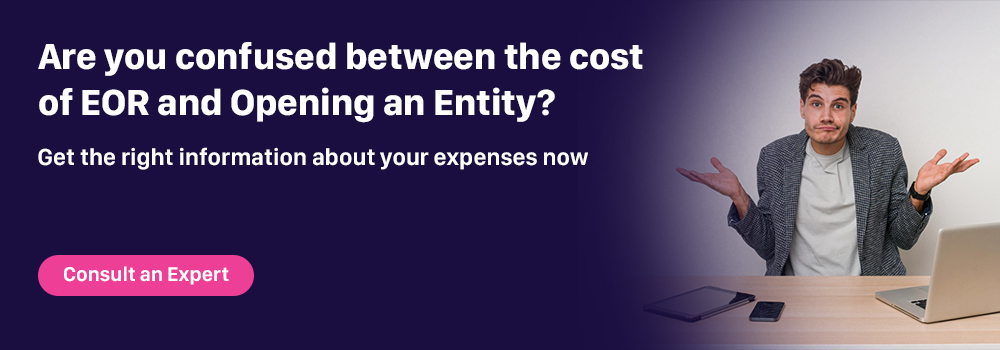Quick Summary
This blog brushes on EOR vs. opening an entity. EOR offers lower costs, faster setup, and simplified compliance, ideal for small to mid-sized teams. Opening an entity involves higher expenses, longer timelines, and added administrative burdens suitable for long-term, large-scale operations.
Businesses often feel confused when choosing between an EOR vs. opening an entity for global growth. The choice depends on company requirements and cost-effectiveness.
The EOR model allows companies to establish a presence in a new country without dealing with labor laws or legal complexities. Setting up a legal entity means creating a subsidiary or branch. This process is more complex and costly, but it gives the company full control.
For businesses wanting to grow in India, knowing the costs of both models is key. This is especially true for startups with tight budgets. This blog will look at the costs of EOR and setting up a legal entity. It will help you find the most cost-effective way to expand.
Cost of Employer of Record
Employer of record is a relatively less expensive model with an initial setup cost, which is one of the biggest advantages. The cost of hiring remote employees in India with an EOR partner is USD 13,346.34. This is the sum after combining the service charge and the average typical salaries of the 6-member team. If you plan to establish a footprint outside your country, taking assistance from a global EOR partner would be advantageous.
A multi-country EOR does not concentrate on one nation; it provides services across various countries. A multi-country EOR typically has greater service fees than a local EOR. Global EORs normally bill a monthly flat fee of USD 600–800 per person.
It can be costly to work with a worldwide EOR service provider for several teams located in several nations. Rather, using a local EOR independently for every nation significantly lowers expenses.
Cost of Legal Entity
In India, to set up a subsidiary, you will need to pay the government fees. You need to complete name reservation, incorporation filing, DIN application, PAN/TAN filing, etc. The cost for those activities generally should be INR 7,000-20,000.
This also includes professional fees, paid to the respective lawyer and an accountant. You have to hire a lawyer and an accountant to handle your documentation, compliance, and filing processes. Their fees average between INR 10,000 and 50,000. It is also dependent on the number and complexity of the incorporation process.
The notarization fee and the stamp duty on the articles of association, plus the memorandum, are examples of additional miscellaneous head expenses. It involves the cost of obtaining a single registered office address. The prices under the miscellaneous titles are between INR 5,000 and INR 10,000.
The final cost for setting up an organization in India would come up to 15,000 to 50,000 rupees at most. Once again, it is dependent upon the needs of the business.
Comparison Between the Cost of EOR vs. Opening an Entity
We have understood the cost of EOR and opening an entity individually. It becomes crucial to understand the cost comparison between EOR vs. opening an entity while deciding on global expansion. Both the models have better solutions but there is a great difference in terms of costs and operational structure. let’s compare both models for expanding in India.
| Cost Element | EOR | Entity Setup |
| Initial Cost Lower: | Onboarding fees, legal compliance checks | Incorporation, legal, consulting fees, and office setup |
| Running Cost | Consolidated monthly fees, payroll management, and employee benefits | Payroll, HR, compliance, infrastructure, accounting, tax filings |
| Closing Cost | Minimal: Exit fees, final tax clearances | High: Legal dissolution, employee terminations, asset liquidation |
| Cost of your time | No involvement in compliance and operations, so the time involved is only in work execution and allocation. | Apart from work execution, management has to get involved in compliance, operations, and logistics. |
Initial Cost:
Compared to opening an entity, EOR has a lower initial cost. This includes incorporation fees, office setup, and legal procedures.
Running Cost:
EOR provides a simple payment structure with a fixed monthly fee. Being cost-effective, EOR is the best option for small to medium operations. With a legal entity, it’s almost the opposite of EOR. It offers a broader range of recurring expenses, including payroll, compliance, HR, and infrastructure maintenance.
Closing Cost:
Regarding flexibility, EOR is the best option with minimal closing costs and a parallel simplified exit process. It’s a big struggle and an expensive process when shutting down an entity.
Cost of your time:
Time is a key distinction between EOR vs. opening an entity. Costs associated with time can greatly impact your total investment and time to market.
-
- EOR: Employee onboarding through an EOR can be completed quickly, taking one or two weeks on average, enabling a swift launch into new markets. The EOR handles the legal and administrative responsibilities, greatly lessening the time commitment on the parent company.
- Opening an Entity: Establishing an Entity depends on the industry and the intricacy of the company; it will take three to twelve months. The time and resources required for the entire process are increased by the continuous legal consultations, compliance procedures, and delays during this time.
The comparison is more about scalability and long-term financial impact. At the same time, both terms are compared by control and flexibility. With EOR, the business gets a simplified cost structure, and with the opening of an entity, the business enters the market.
The flexibility of EOR is attractive for businesses that are planning to hire a small team without any administrative burden. Businesses that want full control over their operations automatically get pushed towards forming a subsidiary.
Conclusion
While choosing between the models EOR and opening an entity for expansion in India, cost, control, and flexibility are the main concerns. The EOR model is the most cost-effective and ideal option for small and medium-scale businesses. It can efficiently manage the team and streamline the hiring process without having to establish an entity in the respective country. This is the best option for companies exploring new markets.
On the other side, for larger organizations seeking full control over their operations, establishing an entity would be a better and long-term solution. Despite having higher initial, running, and closing costs, it turns out to be a better way of expansion in India. It becomes a complex decision when permanence and higher financial commitments are involved.
The blog concludes that both options are the best, and the right choice depends on the aims and objectives of your organization. For many, EOR is a preferable model due to its flexible and low-risk characteristics. While the companies that prefer overall control and scalability for the long term would prefer an entity, however, for most of the organizations, the entity is not the best-suited option, as it adds on a lot more compliance and monetary burden. Thus, it is quite ideal to opt for an EOR solution if you do not plan to sell in that country.





 Schedule a free call
Schedule a free call